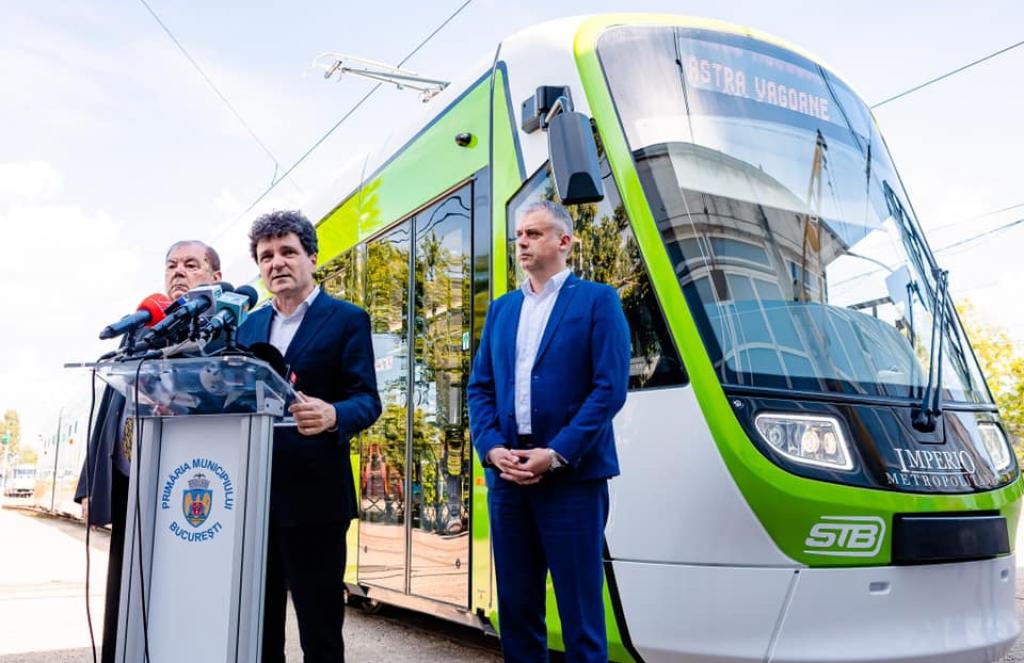Thessaloniki gets ready for its metro launch in November
The underground rapid transit lines have been under construction for almost two decades due to various project delays
 TheMayor.EU logo
TheMayor.EU logo 
L-R: Astra Vagoane President, Valer Blidar, Mayor Nicusor Dan, STB Director, Adrian Criț, Source: City of Bucharest
The city had to spend 200 million euros on the vehicles, as well as an additional 600 million to modernise the tracks
In May 2021, local authorities in Bucharest signed a 200 million euro deal with the Romanian tram manufacturer, Astra Vagone, for 100 new trams. Recently, the first vehicle was delivered to city officials and Mayor Nicușor Dan held a press conference to mark the occasion.
According to a statement by the city, the company will start delivering the 100 trams on a tight schedule, bringing in four trams every month. The whole order of trams is set to finish after a 15-month period when much of Bucharest’s tram network will be modernised.
The tram purchase is a big deal for Bucharest, as this is the biggest one of its kind since 1989. For the last 30 years, there have been only 17 vehicles, bought by the municipality. The new trams, however, were financed through the European Union and according to Mayor Dan, came with strings attached.
The main one he referred to was the fact authorities had to modernise the tram tracks in much of the city – something they had not done in a long time. This also made the tram project even more expensive, as last April, authorities announced a plan to redevelop around 80 kilometres of tracks.
The project’s costs were set at around 600 million euros, which would come through from the Romanian Recovery and Resilience Fund. This means that the trams have, in a way, provoked Bucharest authorities to redevelop the whole network to the tune of 800 million euros in total.
Despite the high cost of modernising the tram fleet, the new purchases come with a lot of benefits that could prove fundamental to the sustainable mobility transition in Bucharest. According to the head of the municipal transport company, Adrian Criț, the new trams are around two to three times more efficient than what the city currently operates.
He explained that the new trams need around 0.6 kilowatt-hours per ton-kilometre, while the older 1975 models which permeate the transit network need around 0,11 to 0,21 kilowatt-hours per ton kilometre. He also explained that the new ones can handle up to 20% more passengers, making them much more efficient and sustainable.

The underground rapid transit lines have been under construction for almost two decades due to various project delays

Now you can get your wine in Talence by paying directly in Bitcoin

That’s because the state has to spend money on updating the railway infrastructure rather than subsidizing the cost of the popular pass

Rethinking renewable energy sources for the urban landscape

The examples, compiled by Beyond Fossil Fuels, can inform and inspire communities and entrepreneurs that still feel trepidation at the prospect of energy transition

Now you can get your wine in Talence by paying directly in Bitcoin

The 10th European Conference on Sustainable Cities and Towns (ESCT) sets the stage for stronger cooperation between the EU, national and local level to fast track Europe's transition to climate neutrality.

At least, that’s the promise made by the mayor of Paris, Anne Hidalgo

The underground rapid transit lines have been under construction for almost two decades due to various project delays

At least, that’s the promise made by the mayor of Paris, Anne Hidalgo

Hostal de Pinós is located in the geographical centre of the autonomous region

Despite its church-y name, the district has long been known as the hangout spot for the artsy crowds

Urban dwellers across the EU are having a say in making their surroundings friendlier to people and the environment.

Forests in the EU can help green the European construction industry and bolster a continent-wide push for architectural improvements.

Apply by 10 November and do your part for the transformation of European public spaces

An interview with the Mayor of a Polish city that seeks to reinvent itself

An interview with the newly elected ICLEI President and Mayor of Malmö

A conversation with the Mayor of Lisbon about the spirit and dimensions of innovation present in the Portuguese capital














